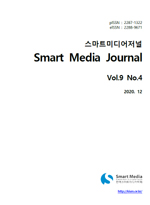학술논문
구어체 말뭉치의 어휘 사용 특징 분석 및 감정 어휘 사전의 자동 구축
이용수 370
- 영문명
- Analyzing Vocabulary Characteristics of Colloquial Style Corpus and Automatic Construction of Sentiment Lexicon
- 발행기관
- 한국스마트미디어학회
- 저자명
- 강승식(Seung-Shik Kang) 원혜진(HyeJin Won) 이민행(Minhaeng Lee)
- 간행물 정보
- 『스마트미디어저널』Vol9, No.4, 144~151쪽, 전체 8쪽
- 주제분류
- 공학 > 컴퓨터학
- 파일형태
- 발행일자
- 2020.12.30
4,000원
구매일시로부터 72시간 이내에 다운로드 가능합니다.
이 학술논문 정보는 (주)교보문고와 각 발행기관 사이에 저작물 이용 계약이 체결된 것으로, 교보문고를 통해 제공되고 있습니다.

국문 초록
모바일 환경에서 의사소통은 SMS 문자로 이루어진다. SMS 문자에서 사용되는 어휘들은 일반적인 한국어 문어체 문장에서 사용되는 어휘들과 다른 부류의 어휘들이 사용될 것으로 예상할 수 있다. 예를 들어, 일반적인 문어체의 경우 문장의 시작이나 끝맺음이 올바르고 문장의 구성요소가 잘 갖추어졌지만, SMS 문자 말뭉치의 경우 구성요소를 생략 및 간략한 표현으로 대체하는 경우가 많다. 이러한 어휘 사용 특성을 분석하기 위하여, 기존에 구축된 구어체 말뭉치와 문어체 말뭉치를 사용한다. 실험에서는 구어체 말뭉치인 SMS 문자 말뭉치와 네이버 영화평 말뭉치, 그리고 문어체 말뭉치인 한국어 문어체 원시 말뭉치의 어휘 사용 특성을 비교-분석한다. 말뭉치별 어휘 비교 및 분석을 위하여 품사 태그 형용사(VA)를 기준으로 하였고, 공연강도를 측정하기 위해 변별적 공연어휘소 분석 방법론을 사용하였다. 그 결과 ‘좋-’, ‘죄송하-’, ‘즐겁-’ 등 감정표현 형용사들이 SMS 문자 말뭉치에서 선호되는 반면, 네이버 영화평 말뭉치에서는 평가 표현과 관련된 형용사들이 선호되는 것을 확인할 수 있었다. 이러한 과정에서 추출된 공연강도가 높은 형용사를 기준으로 감정어휘 사전을 자동 구축하기 위하여 단어 임베딩 기법을 사용하였으며, 총 343,603개의 감성어휘를 자동 구축하였다.
영문 초록
In a mobile environment, communication takes place via SMS text messages. Vocabularies used in SMS texts can be expected to use vocabularies of different classes from those used in general Korean literary style sentence. For example, in the case of a typical literary style, the sentence is correctly initiated or terminated and the sentence is well constructed, while SMS text corpus often replaces the component with an omission and a brief representation. To analyze these vocabulary usage characteristics, the existing colloquial style corpus and the literary style corpus are used. The experiment compares and analyzes the vocabulary use characteristics of the colloquial corpus SMS text corpus and the Naver Sentiment Movie Corpus, and the written Korean written corpus. For the comparison and analysis of vocabulary for each corpus, the part of speech tag adjective (VA) was used as a standard, and a distinctive collexeme analysis method was used to measure collostructural strength. As a result, it was confirmed that adjectives related to emotional expression such as good- , sorry- , and joy- were preferred in the SMS text corpus, while adjectives related to evaluation expressions were preferred in the Naver Sentiment Movie Corpus. The word embedding was used to automatically construct a sentiment lexicon based on the extracted adjectives with high collostructural strength, and a total of 343,603 sentiment representations were automatically built.
목차
Ⅰ. 서론
Ⅱ. 말뭉치에 출현한 감정 어휘의 비교-분석
Ⅲ. 감정 어휘 사전의 구축
Ⅳ. 결론 및 향후 연구
REFERENCES
해당간행물 수록 논문
- AR기반 교육용 콘텐츠분석을 위한 통계분석서비스 모형 설계
- 농작물을 위한 드론 분무 농약 살포의 3차원 분석에 관한 연구
- 네 자리 숫자 비밀번호 2차 조사 자료에 의한 국내 패스워드 재사용 추론 연구
- 대용량 멀티미디어 데이터 전송을 위한 효율적인 채널 검색 방법
- A Study on Applying the SRCNN Model and Bicubic Interpolation to Enhance Low-Resolution Weeds Images for Weeds Classification
- 서비스 플랫폼 기반 이중강화적용 블록체인 응용 거래모델 제안
- 인터넷 의료 애플리케이션 사용 행위에 영향을 미치는 요소에 관한 연구
- 모노펄스 추적 알고리즘 성능 향상을 위한 능동위상배열안테나 제어 기법
- PLN 성분 분석을 통한 전기장센서 기반 손동작신호 추출
- Conjoint Analysis of User Needs in Mobile Payment Interface Design
- IPA를 활용한 건축 설계단계 VR 적용가능업무 평가
- Hyper-parameter Optimization for Monte Carlo Tree Search using Self-play
- 자율주행 환경에서 이미지 객체 분할을 위한 강화된 DFCN 알고리즘 성능연구
- 대규모 외생 변수 및 Deep Neural Network 기반 금융 시장 예측 및 성능 향상
- 에너지 디지털 트윈을 위한 요구사항 분석 및 AAS 설계
- 구어체 말뭉치의 어휘 사용 특징 분석 및 감정 어휘 사전의 자동 구축
- 폐암환자 생존분석에 대한 TNM 병기 군집분석 평가
- 기계학습 알고리즘을 이용한 Curation 서비스 구현
- Fast Super-Resolution GAN 기반 자동차 번호판 검출 및 인식 성능 고도화 기법
- 토픽모델링을 통한 북한의 경제정책 동향 분석
- 딥러닝 기반 이미지 특징 추출 모델을 이용한 유사 디자인 검출에 대한 연구
- EF 센서기반 손동작 신호 감지 및 자동 프레임 추출
참고문헌
관련논문
공학 > 컴퓨터학분야 BEST
- 청소년들의 스마트폰 중독예방을 위한 이야기치료 집단상담 프로그램 개발
- 지도서비스를 이용한 위치 기반 관광 빅데이터의 시각화
- 틱톡의 숏폼 콘텐츠 특성이 관광지 이미지 및 방문의도에 미치는 영향
공학 > 컴퓨터학분야 NEW
더보기최근 이용한 논문
교보eBook 첫 방문을 환영 합니다!

신규가입 혜택 지급이 완료 되었습니다.
바로 사용 가능한 교보e캐시 1,000원 (유효기간 7일)
지금 바로 교보eBook의 다양한 콘텐츠를 이용해 보세요!





